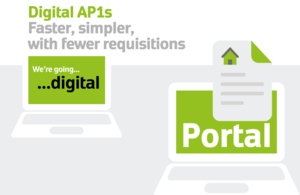From November 2022 we will accept only digital applications for simple updates to existing titles via our online customer portal.

HM Land Registry is changing the way we receive and process register update applications. Most applications received are submitted as PDFs or scanned copies using the customer portal or Business Gateway platform. These services can now accept digital applications.
Instead of uploading PDFs or scans, the data is entered directly into our systems and is automatically checked for errors against information held in the register as well as calculating the correct fee.
We have worked with our customers to develop these digital services. Since
digital applications went into live testing in April 2021, more than 100,000 applications have been submitted. This customer engagement will continue to help develop the service further and to aid the transition from one service to the other.Law firm Taylor Rose MW was an early adopter of digital applications. Dawn Goodwin, Team Leader Post Completion, commented:
It takes ten minutes to complete an application. We used to generate the AP1s ourselves. Interestingly we don’t get requisitions for spelling errors now, which has taken a massive chunk of the requisitions away. That was always an issue, it [digital applications] has taken it away…It’s faster and so easy to use. The work of getting the application created and submitted is getting done more quickly.
Chief Executive and Chief Land Registrar of HM Land Registry, Simon Hayes, added:
I am very pleased to be announcing this move to digital applications, which I believe creates a number of opportunities for our customers and for HM Land Registry. By validating applications automatically prior to submission, the new process reduces errors, meaning fewer applications are sent back to our customers for clarification or more information, which is always a source of frustration for all involved.
For HM Land Registry, elements of the caseworker review can be automated, speeding up or removing many of the manual tasks traditionally required to process an application, enabling quicker service times in the future. By automating in this way we also free up our expert caseworkers to spend more time on complex cases, which will also benefit customers.
We are currently seeing a 25% drop in requisitions where digital applications are being used for charge/transfer and transfer-only applications – and we expect that to improve even further.

No comments:
Post a Comment